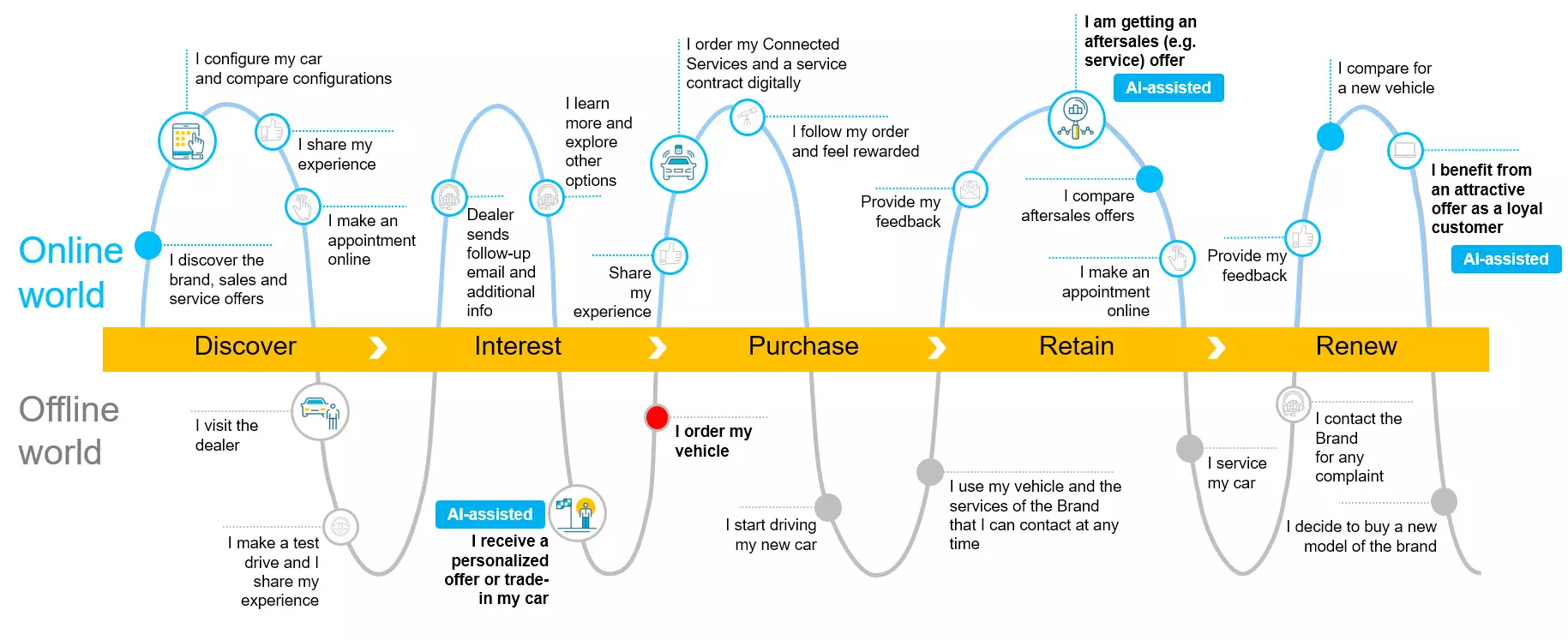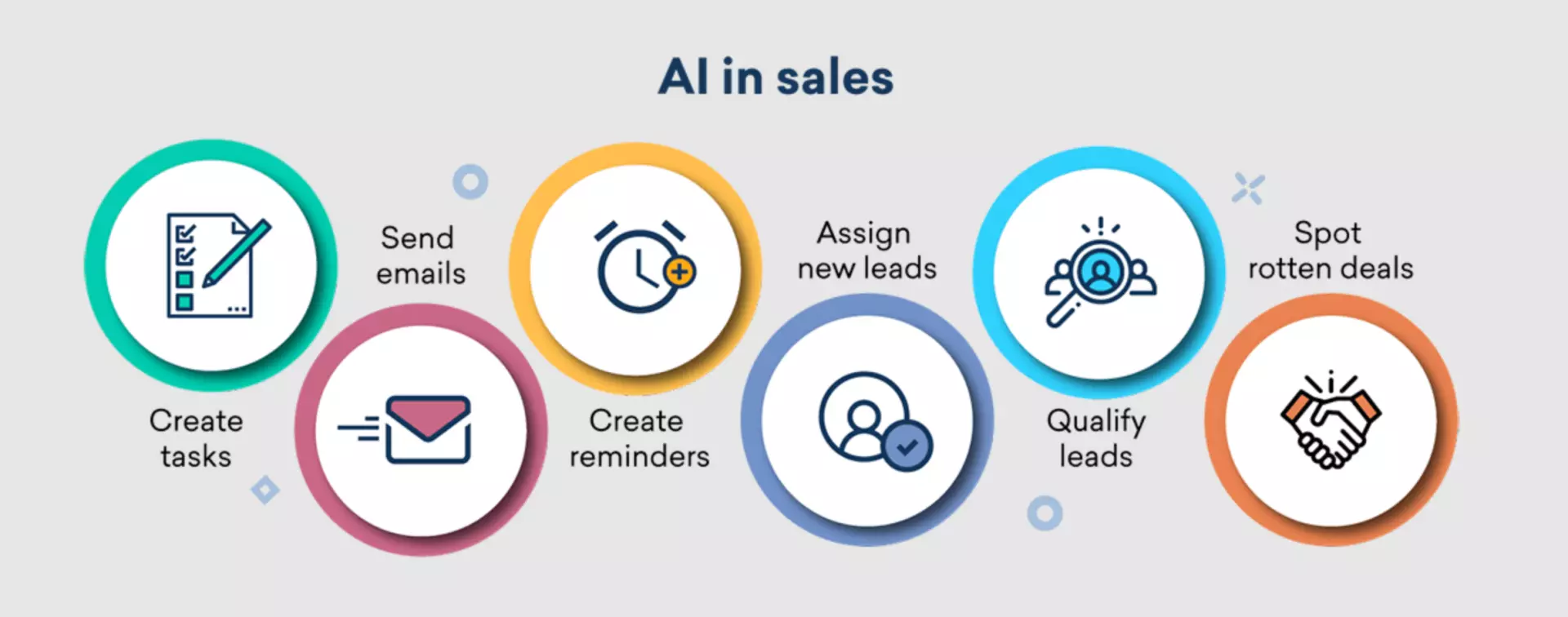The integration of artificial intelligence (AI) in the sales process helps organizations to get more leads, optimize prices, and close more deals.
Artificial Intelligence Can Bring More Customers Offline and Online

Sales departments often face multiple challenges such as finding leads, converting prospective leads, maintaining customer relationships, and gathering information about clients. Generally, sales representatives have to make multiple calls and send numerous emails to schedule appointments with clients. Even after scheduling meetings, a client may or may not be interested in doing business. Hence, the sales personnel’s job can be immensely complicated and time-consuming. AI applications can transform oil and gas, healthcare, manufacturing, retail, and many other industries by streamlining various tasks.
Likewise, the implementation of AI in sales departments can simplify and automate multiple crucial tasks such as recording data and scheduling meetings, which can improve workplace productivity. With this technology, sales representatives can prioritize core tasks like finding and converting leads and maintaining customer relationships. In core tasks such as lead conversion, AI systems can offer a data-driven approach for scoring and converting prospective leads. Also, AI-powered analytics can help business leaders evaluate their current business strategies and help in making informed decisions while developing new strategies.
Benefits of Artificial Intelligence in Sales
Artificial intelligence (AI) is helping companies boost lead volume, improve close rate, and supercharge overall sales performance. That's because this technology can automate and augment much of the sales process. As a result, salespeople are free to focus on what matters: closing the sale.

The implementation of AI in sales can help businesses in the following ways:
1. Lead Generation
Sales personnel have to make key decisions regarding potential clients on a daily basis to meet their monthly and quarterly quota. However, lead generation or lead scoring can be a complicated task as it may be highly dependent on gut instinct and incomplete data. Hence, the entire process can be extremely tedious and error-prone.
AI systems can collect and analyze large volumes of historical client data such as social media posts and interaction history. With the help of this data, AI systems can offer predictive lead scoring and rank different leads in the sales pipeline based on the likelihood of getting a successful deal. With increasing volumes of data, AI systems can deliver more accurate predictions about each potential client. Hence, the integration of AI in sales helps sales personnel prioritize prospective leads and spend time only on leads that are more likely to be converted.
2. Sales Forecast
Sales managers need to their team’s sales numbers every quarter to evaluate their current sales strategy and performance. For this purpose, sales managers need to analyze large volumes of data which includes sales outcomes history and customer contact records. However, manual sales forecasting can be error-prone and time-consuming.
By leveraging AI in sales, managers can predict their sales numbers accurately. To deliver accurate outcomes, AI systems analyze large volumes of customer data and sales data. Based on this data, sales managers can predict their teams’ sales numbers and take the necessary steps to enhance sales. Also, AI systems can help sales personnel identify prospective customers and deals that have high chances of closing.
We could also talk more about field sales representatives and how using AI helps improve their performance by having them focus on the right deals. This can help to maximize their time and efforts spent in the field, ensuring that they are only speaking with clients who would be more likely to close a deal.
3. Cost Optimization
Figuring out the rate of discount for a client can be extremely tricky as deciding an appealing estimate without losing profits is complicated. However, offering discounts is an effective way of closing a deal. For this purpose, businesses can utilize AI to decide the ideal rate of discount for different clients. For this purpose, AI algorithms analyze historical data that consists of every past deal to understand various details that led to a successful deal. AI algorithms analyze data such as the company size, number of competitors, geographical location, clients’ industry, annual revenues of clients, and experience with a client. Based on such data, AI systems can help businesses decide a rate of discount that has the highest probability of closing a deal without losing significantly in terms of revenue. In this manner, the implementation of AI in sales can help businesses optimize their costs effectively.
4. Cross-Selling and Upselling
Cross-selling and upselling to the existing clientele are among the most economical methods of increasing revenue. However, finding clients who are interested in buying more products or services can be a tricky task. Instead of marketing products to customers who may not be interested, AI can help find customers that may want to purchase new products. AI algorithms can analyze data about every customer and identify the ones who are more likely to purchase a better version of a currently owned product or buy a new product altogether. Hence, businesses can increase their revenue and reduce their marketing costs by leveraging AI in sales.
5. Sales Resource Management
Sales managers have to evaluate their teams’ performance on a monthly basis to assess revenue pipelines and prospective clients. This process can be simplified by implementing AI in sales management. AI systems can monitor and analyze data of multiple sales personnel in real-time and present the data collected on a dashboard. With the help of this dashboard, sales managers can view which sales personnel are most likely to meet their quota and which outstanding deals have high chances of being closed. In this manner, AI-powered dashboards can help sales managers to focus on sales personnel and outstanding deals that can help their company meet their quotas.
6. Automation
Sales departments have multiple admin tasks that need to be performed on a daily basis. These tasks consume a major chunk of the employees’ time that can be spent on other core tasks. By integrating AI in sales departments, employees can effortlessly automate various admin tasks such as saving contact information, logging daily activities, recording attendance data, and identifying high-priority emails. In this manner, AI systems can help businesses enhance employee productivity by automating various tasks. AI can also help automate customer service tasks with the help of chatbots. AI-powered chatbots can resolve customer queries and guide them through various products. In this manner, artificial intelligence can help in improving sales and revenue.
7. Actionable Analytics
One of the most useful applications of AI can be drawing actionable insights from collected data. AI systems can be used to develop a platform that can monitor various success metrics and identify the areas that need improvement. AI-powered platforms can enable business leaders to evaluate different business procedures and marketing strategies. Based on success metrics and analytics, business leaders can develop effective strategies to enhance workplace efficiency and customer engagement. Hence, business leaders can make informed decisions while creating business strategies by integrating AI in sales.
8. Personalization
According to statistics, customers prefer personalized business experiences such as personalized marketing campaigns and product design. AI-based solutions can be increasingly helpful in offering personalized experiences to customers. AI systems can analyze various customer demographics with the help of their personal information, location, purchase history, and social media posts to generate meaningful insights. Based on these insights, business leaders can develop personalized marketing campaigns for different customer demographics. Also, AI systems can evaluate public reviews about various products to identify desirable features, product performance, and customer pain points. Using such detailed data, businesses can design products that deliver better performance and address customers’ pain points to offer a great customer experience.



Leave your comments
Post comment as a guest